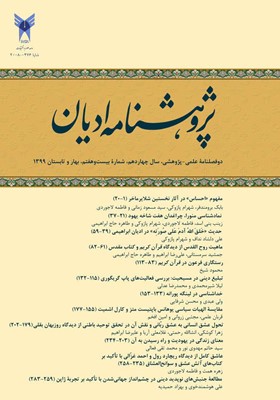مقایسۀ الهیات سیاسی یوهانس باپتیست متز و کارل اشمیت
محورهای موضوعی : مسیحیت
قربان علمی
1
![]() ,
مجتبی زروانی
2
,
امین افخم
3
,
مجتبی زروانی
2
,
امین افخم
3
1 - دانشیار ادیان و عرفان تطبیقی، دانشگاه تهران، تهران، ایران
2 - دانشیار ادیان و عرفان تطبیقی، دانشگاه تهران، تهران، ایران
3 - دانشجوی دکتری تخصصی ادیان و عرفان تطبیقی، دانشگاه تهران، تهران، ایران
کلید واژه: یوهانس باپتیست متز, الهیات سیاسی, کارل اشمیت, عقلِ یادآورانه, یادآوری رنج, یادآوری مصائب عیسی مسیح,
چکیده مقاله :
الهیات سیاسی نوین یوهانس باپتیست متز، کشیش و الهیدان کاتولیک آلمانی، یکی از مهمترین روایتهای الهیات سیاسی مسیحی در مخالفت با فردگرایی، خصوصیسازیِ دین و نگاهِ استبدادی به حکومت است. متز به دلیل انتقادهایش از الهیات سیاسیِ کارل اشمیت و در تضاد با وی، الهیات سیاسی خود را الهیات سیاسی نوین مینامد. به باور متز، اشمیت با ذاتی دانستنِ خشونت در سیاست، الهیات سیاسی ضد دموکراتیک و یهودستیزانهای را ارائه داده که زمینۀ فاشیسم و توجیه حذف دیگران را فراهم کرده است. ازاینرو، در این مقاله، با روش توصیفی- تحلیلی به بررسی مقایسهای الهیات سیاسی متز و اشمیت میپردازیم؛ و همچنین نوآوریهای متز در الهیات سیاسی مسیحی و نقد وی بر اشمیت را بررسی خواهیم کرد. نوآوری اصلی متز این است که وی بر پایۀ زندگی و آموزههای عیسی مسیح و نیز آرای مکتب فرانکفورت، از عقلِ یادآورانه سخن میگوید. این عقلانیت که بر اساس یادآوریِ انتقادیِ گذشته است، میتواند بهعنوان نقطۀ آغاز تازهای برای کار در قلمروی الهیات مسیحی باشد و در تصمیمگیری و کنشهای اجتماعی- سیاسی، نقش مؤثری ایفا کند.
The New political theology of Johannes Baptist Metz, the German Catholic Church priest, and theologian is one of the most important versions of Christian political theology against the position to the individualism, the privatization of religion, and the privatization of religion, and the authoritarian view of government. Metz calls his political theology «New political theology» because of his criticism of Carl Schmitt's political theology, and in opposition to it. According to Metz, Schmidt believed in the inherent nature of violence in politics, presented anti-democratic and anti-Semitic political theology that justified the exclusion of others, and led into fascism. Therefore, in this article, we use a descriptive-analytical method to compare Metz and Schmidt's political theology; we will also examine Metz's innovations in Christian political theology and his critique of Schmidt. Metz's main innovation is that he speaks of «anamnestic reason» based on the life and teachings of Jesus Christ, as well as the views of the Frankfurt School. This rationality, which is based on critical recollections of the past, can serve as a new starting point for work in the realm of Christian theology and can play an effective role in decision-making and social-political actions.
https://www.theguardian.com/world/2005/oct/07/iraq.usa. (Accessed June 6, 2018).
_||_


